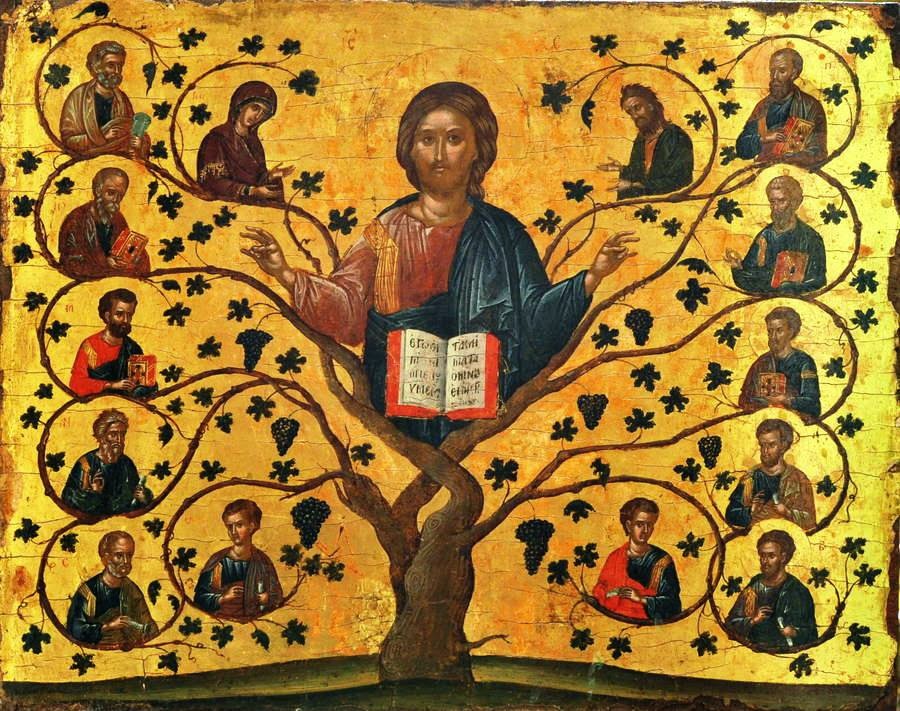Thursday 14 May 2015 (other days)
The Ascension of the Lord
Solemnity
Solemnity
| Responsory |
|---|
When Christ ascended to the heights he captured prisoners: he gave gifts to men, alleluia.
God goes up with shouts of joy, the Lord goes up with trumpet blast. He gave gifts to men, alleluia.
| Second Reading |
|---|
| From a sermon by Saint Augustine |
| No one has ever ascended into heaven except the one who descended from heaven |
|---|
Today our Lord Jesus Christ ascended into heaven; let our hearts ascend with him. Listen to the words of the Apostle: If you have risen with Christ, set your hearts on the things that are above where Christ is, seated at the right hand of God; seek the things that are above, not the things that are on earth. For just as he remained with us even after his ascension, so we too are already in heaven with him, even though what is promised us has not yet been fulfilled in our bodies.
Christ is now exalted above the heavens, but he still suffers on earth all the pain that we, the members of his body, have to bear. He showed this when he cried out from above: Saul, Saul, why do you persecute me? and when he said: I was hungry and you gave me food.
Why do we on earth not strive to find rest with him in heaven even now, through the faith, hope and love that unites us to him? While in heaven he is also with us; and we while on earth are with him. He is here with us by his divinity, his power and his love. We cannot be in heaven, as he is on earth, by divinity, but in him, we can be there by love.
He did not leave heaven when he came down to us; nor did he withdraw from us when he went up again into heaven. The fact that he was in heaven even while he was on earth is borne out by his own statement: No one has ever ascended into heaven except the one who descended from heaven, the Son of Man, who is in heaven.
These words are explained by our oneness with Christ, for he is our head and we are his body. No one ascended into heaven except Christ because we also are Christ: he is the Son of Man by his union with us, and we by our union with him are the sons of God. So the Apostle says: Just as the human body, which has many members, is a unity, because all the different members make one body, so is it also with Christ. He too has many members, but one body.
Out of compassion for us he descended from heaven, and although he ascended alone, we also ascend, because we are in him by grace. Thus, no one but Christ descended and no one but Christ ascended; not because there is no distinction between the head and the body, but because the body as a unity cannot be separated from the head.
| Responsory |
|---|
After his passion Jesus appeared to his disciples over a period of forty days and taught them about the kingdom of God, and while they looked on he was lifted up and a cloud took him from their sight, alleluia.
While he was in their company he told them not to leave Jerusalem, but to wait there for what the Father had promised, and while they looked on he was lifted up and a cloud took him from their sight, alleluia.
| Hymn | Te Deum |
|---|
God, we praise you; Lord, we proclaim you!
You, the Father, the eternal –
all the earth venerates you.
All the angels, all the heavens, every power –
The cherubim, the seraphim –
unceasingly, they cry:
“Holy, Holy, Holy, Lord God of Hosts:
heaven and earth are full of the majesty of your glory!”
The glorious choir of Apostles –
The noble ranks of prophets –
The shining army of martyrs –
all praise you.
Throughout the world your holy Church proclaims you.
– Father of immeasurable majesty,
– True Son, only-begotten, worthy of worship,
– Holy Spirit, our Advocate.
You, Christ:
– You are the king of glory.
– You are the Father’s eternal Son.
– You, to free mankind, did not disdain a Virgin’s womb.
– You defeated the sharp spear of Death, and opened the kingdom of heaven to those who believe in you.
– You sit at God’s right hand, in the glory of the Father.
– You will come, so we believe, as our Judge.
And so we ask of you: give help to your servants, whom you set free at the price of your precious blood.
Number them among your chosen ones in eternal glory.
The final part of the hymn may be omitted:
Bring your people to safety, Lord, and bless those who are your inheritance.
Rule them and lift them high for ever.
Day by day we bless you, Lord: we praise you for ever and for ever.
Of your goodness, Lord, keep us without sin for today.
Have mercy on us, Lord, have mercy on us.
Let your pity, Lord, be upon us, as much as we trust in you.
In you, Lord, I trust: let me never be put to shame.
Let us pray.
Almighty God,
fill us with a holy joy;
teach us how to thank you with reverence and love
on account of the ascension of Christ your Son.
You have raised us up with him:
where he, the head, has preceded us in glory,
there we, the body, are called in hope.
Through our Lord Jesus Christ, your Son,
who lives and reigns with you and the Holy Spirit,
one God, for ever and ever.
Amen.
Let us praise the Lord.
– Thanks be to God









